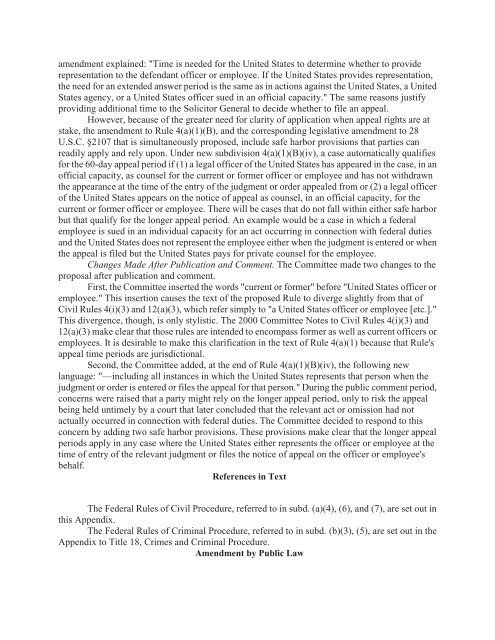Federal Rules of Appellate Procedure 2014-2015, 2014a
Federal Rules of Appellate Procedure 2014-2015, 2014a
Federal Rules of Appellate Procedure 2014-2015, 2014a
Create successful ePaper yourself
Turn your PDF publications into a flip-book with our unique Google optimized e-Paper software.
amendment explained: "Time is needed for the United States to determine whether to provide<br />
representation to the defendant <strong>of</strong>ficer or employee. If the United States provides representation,<br />
the need for an extended answer period is the same as in actions against the United States, a United<br />
States agency, or a United States <strong>of</strong>ficer sued in an <strong>of</strong>ficial capacity." The same reasons justify<br />
providing additional time to the Solicitor General to decide whether to file an appeal.<br />
However, because <strong>of</strong> the greater need for clarity <strong>of</strong> application when appeal rights are at<br />
stake, the amendment to Rule 4(a)(1)(B), and the corresponding legislative amendment to 28<br />
U.S.C. §2107 that is simultaneously proposed, include safe harbor provisions that parties can<br />
readily apply and rely upon. Under new subdivision 4(a)(1)(B)(iv), a case automatically qualifies<br />
for the 60-day appeal period if (1) a legal <strong>of</strong>ficer <strong>of</strong> the United States has appeared in the case, in an<br />
<strong>of</strong>ficial capacity, as counsel for the current or former <strong>of</strong>ficer or employee and has not withdrawn<br />
the appearance at the time <strong>of</strong> the entry <strong>of</strong> the judgment or order appealed from or (2) a legal <strong>of</strong>ficer<br />
<strong>of</strong> the United States appears on the notice <strong>of</strong> appeal as counsel, in an <strong>of</strong>ficial capacity, for the<br />
current or former <strong>of</strong>ficer or employee. There will be cases that do not fall within either safe harbor<br />
but that qualify for the longer appeal period. An example would be a case in which a federal<br />
employee is sued in an individual capacity for an act occurring in connection with federal duties<br />
and the United States does not represent the employee either when the judgment is entered or when<br />
the appeal is filed but the United States pays for private counsel for the employee.<br />
Changes Made After Publication and Comment. The Committee made two changes to the<br />
proposal after publication and comment.<br />
First, the Committee inserted the words "current or former" before "United States <strong>of</strong>ficer or<br />
employee." This insertion causes the text <strong>of</strong> the proposed Rule to diverge slightly from that <strong>of</strong><br />
Civil <strong>Rules</strong> 4(i)(3) and 12(a)(3), which refer simply to "a United States <strong>of</strong>ficer or employee [etc.]."<br />
This divergence, though, is only stylistic. The 2000 Committee Notes to Civil <strong>Rules</strong> 4(i)(3) and<br />
12(a)(3) make clear that those rules are intended to encompass former as well as current <strong>of</strong>ficers or<br />
employees. It is desirable to make this clarification in the text <strong>of</strong> Rule 4(a)(1) because that Rule's<br />
appeal time periods are jurisdictional.<br />
Second, the Committee added, at the end <strong>of</strong> Rule 4(a)(1)(B)(iv), the following new<br />
language: "—including all instances in which the United States represents that person when the<br />
judgment or order is entered or files the appeal for that person." During the public comment period,<br />
concerns were raised that a party might rely on the longer appeal period, only to risk the appeal<br />
being held untimely by a court that later concluded that the relevant act or omission had not<br />
actually occurred in connection with federal duties. The Committee decided to respond to this<br />
concern by adding two safe harbor provisions. These provisions make clear that the longer appeal<br />
periods apply in any case where the United States either represents the <strong>of</strong>ficer or employee at the<br />
time <strong>of</strong> entry <strong>of</strong> the relevant judgment or files the notice <strong>of</strong> appeal on the <strong>of</strong>ficer or employee's<br />
behalf.<br />
References in Text<br />
The <strong>Federal</strong> <strong>Rules</strong> <strong>of</strong> Civil <strong>Procedure</strong>, referred to in subd. (a)(4), (6), and (7), are set out in<br />
this Appendix.<br />
The <strong>Federal</strong> <strong>Rules</strong> <strong>of</strong> Criminal <strong>Procedure</strong>, referred to in subd. (b)(3), (5), are set out in the<br />
Appendix to Title 18, Crimes and Criminal <strong>Procedure</strong>.<br />
Amendment by Public Law


















